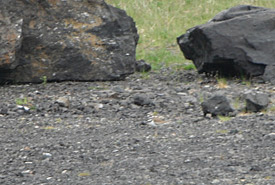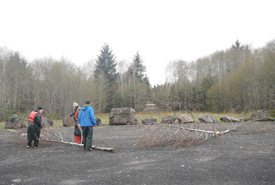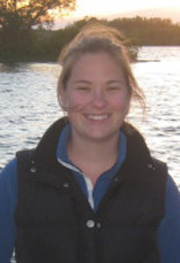New year, new beginnings – even if it’s not in an ideal spot

Can you spot the killdeer? (Photo by Sarah Wallace/Dispatches from the Field)
Often when biologist go out to the field for their first time, they are super excited and usually think they have it all under control. Thoughts, such as, “Oh I can carry all of those heavy totes myself,” or “I will map out the exact route we will take and we will not need to deviate from the plans,” will run through their heads. However as many of us learn, you can never do it all by yourself. You quickly learn that sometimes you just need that little extra support.
It was early spring when I was in Haida Gwaii to conduct my fieldwork for my project studying Cassin’s auklet, a seabird. It was a still a bit chilly, as Haida Gwaii is quite a bit north up the coast of British Columbia. One of the first days I was there, the others in the field crew and myself were walking from our field vehicle to the water, where our boat was tied up. Keep in mind, we were dressed in about five layers each as it was extremely cold and very wet when we travelled in a hurricane boat out on the ocean inlets to find the isolated seabird colonies. As we were trekking to the boat with all of our layers on and carrying all of our gear, we heard some shrieking coming from the middle of the parking lot.
I was confused at first as to who could be making that high-pitched sound, since I couldn’t see anything. However, when I listened carefully I could hear the words “kill-deeeer” in the shrieks. When I looked closely, I could see a little bird frantically running around with its skinny long legs. I recognized this species before as I had seen it around my house before: a shorebird called killdeer!

Building a barricade of (not so small) branches (Photo by Sarah Wallace/Dispatches from the Field)
Killdeers do like to nest in gravel and in grass, so you have likely seen them along side roads or on golf courses. However, this particular individual thought it would be a good idea to make a nest right in the middle of a parking lot!
Luckily, as a result of the cooler weather still, not many tourists were around. The field crew and I began to grab large sticks and branches from nearby trees to put around the nest as barricades. The killdeer continued to squawk its name “kill-deer” as it ran around it’s nest almost, as if saying “No, I do not need your help!” Little did it realize, the stick barricades would hopefully signal to people coming by in the future to watch out for something important!
Even though we didn’t find the species we were looking for that day, we were still able to help another species protect their nest. We can all use that extra support sometimes!
This article originally appeared in Dispatches from the Field and is posted with permission on Land Lines.


